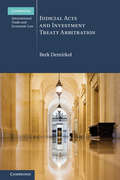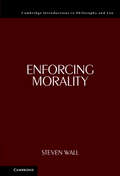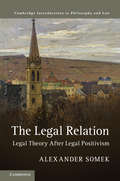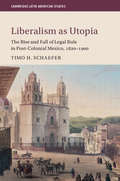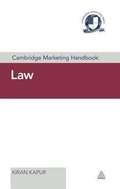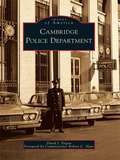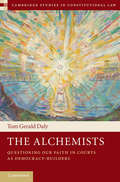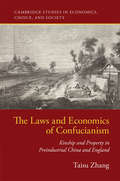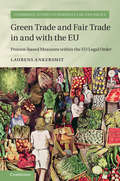- Table View
- List View
Cambridge International Trade and Economic Law: Judicial Acts and Investment Treaty Arbitration (Cambridge International Trade and Economic Law)
by Berk DemirkolJudicial acts of states are becoming increasingly subjected to international investment claims. This book focuses on distinctive particularities of these claims. Although there are no special responsibility regimes for different functions of the state, the application of investment treaty standards and the threshold for their breach may vary depending on the function involved. Accordingly, in order for the state to incur responsibility for a wrongful act committed in the exercise of its judicial function, there are some specific conditions that should be met: the investor must establish that the state is responsible for a breach attributable to the state; the investment tribunal has jurisdiction over the particular dispute; and the damage that the investor has suffered is a result of the particular breach. Berk Demirkol addresses questions in relation to the substance, jurisdiction, admissibility, and remedies in cases where state responsibility arises from a wrongful judicial act.
Cambridge International Trade and Economic Law: Optimal Regulation and the Law of International Trade
by Boris RigodAre the limitations imposed on World Trade Organization (WTO) members' right to regulate efficient? This is a question that is only scarcely, if ever, analysed in existing literature. Boris Rigod aims to provide an answer to this fundamental concern. Using the tools of economic analysis and in particular the concept of economic efficiency as a benchmark, the author states that domestic regulatory measures should only be subject to scrutiny by WTO bodies when they cause negative international externalities through terms of trade manipulations. He then suggests that WTO law, applied by the WTO judiciary can prevent WTO members from attaining optimal levels of regulation. By applying a law and economics methodology, Rigod provides an innovative solution to the problem of how to reconcile members' regulatory autonomy and WTO rules as well as offering a novel analytical framework for assessing domestic regulations in the light of WTO law.
Cambridge International Trade and Economic Law: WTO Dispute Settlement and the TRIPS Agreement
by Matthew KennedyThe TRIPS Agreement was implemented in the WTO to gain access to a functioning dispute settlement mechanism that could authorize trade sanctions. Yet TRIPS and the WTO Dispute Settlement Understanding are based on systems that developed independently in WIPO and GATT. In this book, Matthew Kennedy exposes the challenges created by the integration and independence of TRIPS within the WTO by examining how this trade organization comes to grips with intellectual property disputes. He contrasts the way intellectual property disputes between governments have been handled before and after the establishment of the WTO. Based on practical experience, this book provides a comprehensive review of the issues that arise under the DSU, TRIPS, GATT 1994 and other WTO agreements in intellectual property matters. These range from procedural pitfalls to substantive treaty interpretation and conflicts as well as remedies, including cross-retaliation.
Cambridge Introductions to Philosophy and Law: Enforcing Morality (Cambridge Introductions To Philosophy And Law Ser.)
by Steven WallCambridge Introductions to Philosophy and Law: Legal Theory after Legal Positivism (Cambridge Introductions to Philosophy and Law)
by Alexander SomekWhat is law? The usual answer is that the law is a system of norms. But this answer gives us at best half of the story. The law is a way of relating to one another. We do not do this as lovers or friends and not as people who are interested in obtaining guidance from moral insight. In a legal context, we are cast as 'character masks' (Marx), for example, as 'buyer' and 'seller' or 'landlord' and 'tenant'. We expect to have our claims respected simply because the law has given us rights. We do not want to give any other reason for our behavior than the fact that we have a legal right. Backing rights up with coercive threats indicates that we are willing to accept legal obligations unwillingly. This book offers a conceptual reconstruction of the legal relation on the basis of a critique of legal positivism.
Cambridge Latin American Studies: The Rise and Fall of Legal Rule in Post-Colonial Mexico, 1820–1900 (Cambridge Latin American Studies #106)
by Schaefer Timo H.Liberalism as Utopia challenges widespread perceptions about the weakness of Mexico's nineteenth-century state. Schaefer argues that after the War of Independence non-elite Mexicans - peasants, day laborers, artisans, local merchants - pioneered an egalitarian form of legal rule by serving in the town governments and civic militias that became the local faces of the state's coercive authority. These institutions were effective because they embodied patriarchal norms of labor and care for the family that were premised on the legal equality of male, adult citizens. The book also examines the emergence of new, illiberal norms that challenged and at the end of the century, during the dictatorship of Porfirio Daz, overwhelmed the egalitarianism of the early-republican period. By comparing the legal cultures of agricultural estates, mestizo towns and indigenous towns, Liberalism as Utopia also proposes a new way of understanding the social foundations of liberal and authoritarian pathways to state formation in the nineteenth-century world.
Cambridge Marketing Handbook: Law
by Kiran KapurMarketers should be aware that there is a large amount of regulation and legislation and that ignorance of the law is not an excuse. However, many marketers feel very unsure how the various rules and regulations affect them. This handbook examines the key issues that affect marketers in marketing communications, including both traditional media such as advertisements and social media. Written by a marketer, rather than a lawyer, this handbook is designed to give practical guidance on all the necessary aspects. Legal language is very precise, and hence complicated; this handbook uses colloquial language for clarity. Each chapter includes clear summaries, examples and flow diagrams to help marketers understand how to comply.
Cambridge Philosophy Classics: What is a Law of Nature?
by D. M. ArmstrongFirst published in 1985, D. M. Armstrong's original work on what laws of nature are has continued to be influential in the areas of metaphysics and philosophy of science. Presenting a definitive attack on the sceptical Humean view, that laws are no more than a regularity of coincidence between stances of properties, Armstrong establishes his own theory and defends it concisely and systematically against objections. Presented in a fresh twenty-first-century series livery, and including a specially commissioned preface written by Marc Lange, illuminating its continuing importance and relevance to philosophical enquiry, this influential work is available for a new generation of readers.
Cambridge Police Department (Images of America)
by David J. Degou Commissioner Robert HaasFormally organized in 1859 with the appointment of John C. Willey as the first chief of police, the Cambridge Police Department was then manned by only 16 officers. The department has grown dramatically from its humble beginnings and today employs 277 sworn officers and a civilian staff of 37. Cambridge Police Department, the first comprehensive photographic history of the department, contains over 100 years of historical photographs, including images of specialized traffic and K-9 units, auxiliary police officers, uniforms, and equipment. Many of the vintage photographs in the collection have come from the department archives or were donated by family members of Cambridge officers.
Cambridge Studies In European Law And Policy: Gendering European Working Time Regimes
by Ania ZbyszewskaThe standard approach to regulating working hours rests on gendered assumptions about how paid and unpaid work ought to be divided. In this book, Ania Zbyszewska takes a feminist, socio-legal approach to evaluate whether the contemporary European working time regimes can support a more equal sharing of this work. Focusing on the legal and political developments surrounding the EU's Working Time Directive and the reforms of Poland's Labour Code, Zbyszewska reveals that both regimes retain this traditional gender bias, and suggests the reasons for its persistence. She employs a wide range of data sources and uses the Polish case to assess the EU influence over national policy discourse and regulation, with the broader transnational policy trends also considered. This book combines legal analysis with social and political science concepts to highlight law's constitutive role and relational dimensions, and to reflect on the relationship between discursive politics and legal action.
Cambridge Studies In International and Comparative Law: Proof of Causation in Tort Law
by Sandy SteelCausation is a foundational concept in tort law: in claims for compensation, a claimant must demonstrate that the defendant was a cause of the injury suffered in order for compensation to be awarded. Proof of Causation in Tort Law provides a critical, comparative and theoretical analysis of the general proof rules of causation underlying the tort laws of England, Germany and France, as well as the exceptional departures from these rules which each system has made. Exploring the different approaches to uncertainty over causation in tort law, Sandy Steel defends the justifiability of some of these exceptions, and categorises and examines the kinds of exceptional rules suggested by the case law and literature. Critically engaged with both the theoretical literature and current legal doctrine, this book will be of interest to private law scholars, judges and legal practitioners.
Cambridge Studies in Constitutional Law: Bills of Rights in the Common Law
by Robert LeckeyScholars have addressed at length the 'what' of judicial review under a bill of rights - scrutinizing legislation and striking it down - but neglected the 'how'. Adopting an internal legal perspective, Robert Leckey addresses that gap by reporting on the processes and activities of judges of the highest courts of Canada, South Africa and the United Kingdom as they apply their relatively new bills of rights. Rejecting the tendency to view rights adjudication as novel and unique, he connects it to the tradition of judging and judicial review in the Commonwealth and identifies respects in which judges' activities in rights cases genuinely are novel - and problematic. Highlighting inventiveness in rights adjudication, including creative remedies and guidance to legislative drafters, he challenges classifications of review as strong or weak. Disputing claims that it is modest and dialogic, he also argues that remedial discretion denies justice to individuals and undermines constitutional supremacy.
Cambridge Studies in Constitutional Law: Building the Constitution
by James FowkesThis revisionary perspective on South Africa's celebrated Constitutional Court draws on historical and empirical sources alongside conventional legal analysis to show how support from the African National Congress government and other political actors has underpinned the Court's landmark cases, which are often applauded too narrowly as merely judicial achievements. Standard accounts see the Court as overseer of a negotiated constitutional compromise and as the looked-to guardian of that constitution against the rising threat of the ANC. However, in reality South African successes have been built on broader and more admirable constitutional politics to a degree no previous account has described or acknowledged. The Court has responded to this context with a substantially consistent but widely misunderstood pattern of deference and intervention. Although a work in progress, this institutional self-understanding represents a powerful effort by an emerging court, as one constitutionally serious actor among others, to build a constitution.
Cambridge Studies in Constitutional Law: Dimensions of Dignity
by Jacob WeinribIn an age of constitutional revolutions and reforms, theory and practice are moving in opposite directions. As a matter of constitutional practice, human dignity has emerged in jurisdictions around the world as the organizing idea of a groundbreaking paradigm. By reconfiguring constitutional norms, institutional structures and legal doctrines, this paradigm transforms human dignity from a mere moral claim into a legal norm that persons have standing to vindicate. As a matter of constitutional theory, however, human dignity remains an enigmatic idea. Some explicate its meaning in abstraction from constitutional practice, while others confine themselves to less exalted ideas. The result is a chasm that separates constitutional practice from a theory capable of justifying its innovations and guiding its operation. By expounding the connection between human dignity and the constitutional practices that justify themselves in its light, Jacob Weinrib brings the theory and practice of constitutional law back together.
Cambridge Studies in Constitutional Law: Questioning our Faith in Courts as Democracy-Builders (Cambridge Studies in Constitutional Law #18)
by Daly Tom GeraldCan courts really build democracy in a state emerging from authoritarian rule? This book presents a searching critique of the contemporary global model of democracy-building for post-authoritarian states, arguing that it places excessive reliance on courts. Since 1945, both constitutional courts and international human rights courts have been increasingly perceived as alchemists, capable of transmuting the base materials of a nascent democracy into the gold of a functioning democratic system. By charting the development of this model, and critically analysing the evidence and claims for courts as democracy-builders, this book argues that the decades-long trend toward ever greater reliance on courts is based as much on faith as fact, and can often be counter-productive. Offering a sustained corrective to unrealistic perceptions of courts as democracy-builders, the book points the way toward a much needed rethinking of democracy-building models and a re-evaluation of how we employ courts in this role.
Cambridge Studies in Contentious Politics: Force and Contention in Contemporary China
by Ralph A. Thaxton Jr.Why is contemporary China such a politically contentious place? Relying on the memories of the survivors of the worst catastrophe of Maoist rule and documenting the rise of resistance and protest at the grassroots level, this book explains how the terror, hunger, and loss of the socialist past influences the way in which people in the deep countryside see and resist state power in the reform era up to the present-day repression of the People's Republic of China central government. Ralph A. Thaxton, Jr provides us with a worm's-eye view of an 'unknown China' - a China that cannot easily or fully be understood through made-in-the-academy theories and frameworks of why and how rural people have engaged in contentious politics. This book is a truly unique and disturbing look at how rural people relate to an authoritarian political system in a country that aspires to become a stable world power.
Cambridge Studies in Early Modern British History: Martial Law and English Laws, c. 1500–c. 1700
by John M. CollinsJohn M. Collins presents the first comprehensive history of martial law in the early modern period. He argues that rather than being a state of exception from law, martial law was understood and practiced as one of the King's laws. Further, it was a vital component of both England's domestic and imperial legal order. It was used to quell rebellions during the Reformation, to subdue Ireland, to regulate English plantations like Jamestown, to punish spies and traitors in the English Civil War, and to build forts on Jamaica. Through outlining the history of martial law, Collins reinterprets English legal culture as dynamic, politicized, and creative, where jurists were inspired by past practices to generate new law rather than being restrained by it. This work asks that legal history once again be re-integrated into the cultural and political histories of early modern England and its empire.
Cambridge Studies in Economics, Choice, and Society: Kinship and Property in Preindustrial China and England (Cambridge Studies in Economics, Choice, and Society)
by Taisu ZhangTying together cultural history, legal history, and institutional economics, The Laws and Economics of Confucianism: Kinship and Property in Pre-Industrial China and England offers a novel argument as to why Chinese and English pre-industrial economic development went down different paths. The dominance of Neo-Confucian social hierarchies in Late Imperial and Republican China, under which advanced age and generational seniority were the primary determinants of sociopolitical status, allowed many poor but senior individuals to possess status and political authority highly disproportionate to their wealth. In comparison, landed wealth was a fairly strict prerequisite for high status and authority in the far more 'individualist' society of early modern England, essentially excluding low-income individuals from secular positions of prestige and leadership. Zhang argues that this social difference had major consequences for property institutions and agricultural production.
Cambridge Studies in Economics, Choice, and Society: The Ethics of Influence
by Sunstein Cass R.In recent years, 'Nudge Units' or 'Behavioral Insights Teams' have been created in the United States, the United Kingdom, Germany, and other nations. All over the world, public officials are using the behavioral sciences to protect the environment, promote employment and economic growth, reduce poverty, and increase national security. In this book, Cass R. Sunstein, the eminent legal scholar and best-selling co-author of Nudge (2008), breaks new ground with a deep yet highly readable investigation into the ethical issues surrounding nudges, choice architecture, and mandates, addressing such issues as welfare, autonomy, self-government, dignity, manipulation, and the constraints and responsibilities of an ethical state. Complementing the ethical discussion, The Ethics of Influence: Government in the Age of Behavioral Science contains a wealth of new data on people's attitudes towards a broad range of nudges, choice architecture, and mandates.
Cambridge Studies in Election Law and Democracy: Fragile Democracies
by Samuel IssacharoffTwenty-five years after the fall of the Berlin Wall, the democratic ascendency of the post-Soviet era is under severe challenge. While fragile democracies in Eastern Europe, Africa, and East Asia face renewed threats, the world has witnessed the failed democratic promises of the Arab Spring. What lessons can be drawn from these struggles? What conditions or institutions are needed to prevent the collapse of democracy? This book argues that the most significant antidote to authoritarianism is the presence of strong constitutional courts. Distinct in the third wave of democratization, these courts serve as a bulwark against vulnerability to external threats as well as internal consolidation of power. Particular attention is given to societies riven by deep divisions of race, religion, or national background, for which the courts have become pivotal actors in allowing democracy to take root.
Cambridge Studies in English Legal History: Insurance in Elizabethan England
by Guido RossiEnglish insurance came into being almost entirely during the Elizabethan period. However, the Great Fire of 1666 consumed most of London's mercantile document, and therefore little is known about early English insurance. Using new archival material, this study provides the first in-depth analysis of early English insurance. It focuses on a crucial yet little-known text, the London Insurance Code of the early 1580s, and shows how London insurance customs were first imported from Italy, then influenced by the Dutch, and finally shaped in a systematic fashion in that Insurance Code. The London Insurance Code was in turn heavily influenced by coeval continental codes. This deep influence attests the strong links between English and European insurance, and questions the common/civil law divide on the history of commercial law.
Cambridge Studies in European Law and Policy: EU Renewable Electricity Law and Policy
by Tim Maxian RuscheThere are two basic policy tools for promoting renewable electricity: price regulation (feed-in tariffs) and quantity regulation (green certificates). In economic theory, they are equally efficient. Contrary to conventional thinking, the author demonstrates that under real-world conditions, price regulation is more efficient. EU law obliges Member States to put support schemes in place, but leaves their design to national authorities. They need, however, to comply with EU state aid and internal market rules, and their financing may not result in import duties and discriminatory taxation. This book provides a detailed analysis of the decisions practice adopted by the Commission and the case law of the Union Courts. As support schemes mature, has time not come for putting an end to regulatory competition? With huge efficiency gains to be expected, the author expertly examines the political obstacles and sets out three different pathways to achieve EU-wide harmonization.
Cambridge Studies in European Law and Policy: European Constitutionalism
by Kaarlo TuoriEuropean Constitutionalism redraws the perimeters in the debate on the nature of the European constitution. Offering a fresh approach to both doctrinal and theoretical issues, this book discusses general characteristics of the European constitution under the headings of relationality, perspectivism and discursiveness, and contains forays to sectoral constitutionalization in the micro- and macroeconomic, social and security dimensions. European constitutionalism must be examined in its interaction with Member State constitutionalism, which plays an essential role in channelling democratic legitimacy to the EU. Written by a leading expert in the field, this book will be of great interest to students and scholars alike.
Cambridge Studies in European Law and Policy: Frontex and Non-Refoulement
by Roberta MungianuSince the Frontex Border Agency's establishment in 2004, its activities have foregrounded the complexity and difficulty of protecting the human rights of those seeking access to the European Union. In this connection, protection from refoulement should be paramount in the Agency's work. By navigating through the intricacies of Frontex's structure and working methods, this book answers abiding questions: which circumstances would trigger European Union responsibility if violations were to occur in Frontex's joint operations? What is the legal standing of the principle of non-refoulement in relation to Frontex's activities? Can Frontex be entrusted with an exclusive search and rescue mandate? This book offers a theoretical and practical insight into the legislative intricacies of Frontex's work, examining the responsibility of the EU, and scrutinising the interaction of international law and EU law with a focus on the principle of non-refoulement.
Cambridge Studies in European Law and Policy: Process-based Measures within the EU Legal Order (Cambridge Studies in European Law and Policy)
by Laurens AnkersmitThis book explores how EU law constrains the freedom of the EU, the Member States, and private bodies to adopt measures that seek to protect social and environmental interests abroad by placing conditions on production processes in other states. The permissibility of such process-based measures has been examined primarily within the World Trade Organization (WTO) context, but the challenges that they present are equally for the EU internal market system. Ankersmit identifies three core challenges posed by process-based measures from an EU law perspective: extraterritoriality, unilateralism and the competitive and democratic problems created by private rule-making. It examines these issues in the context of free movement, competition, public procurement, and EU tax law. This book will appeal to academics, policy makers and practitioners interested in trade and environment, the social impact of trade law, and European and international market regulation.
